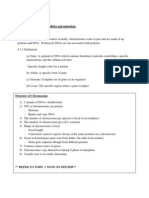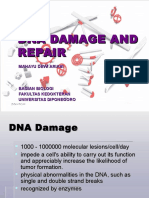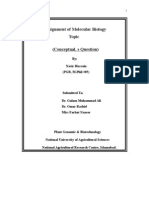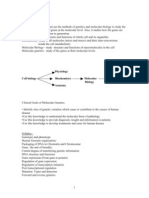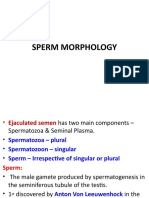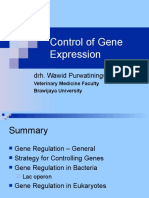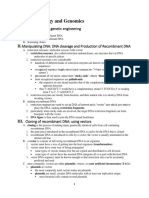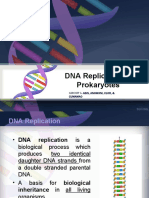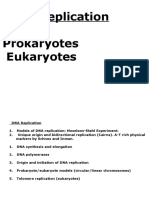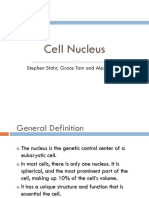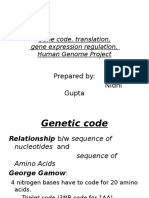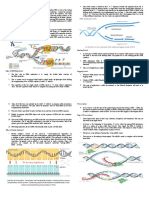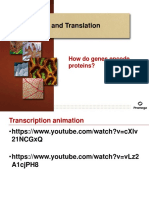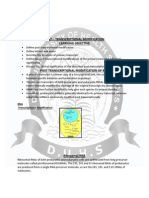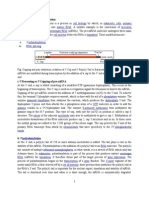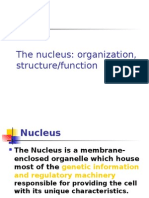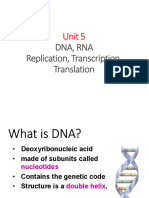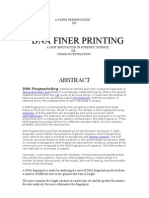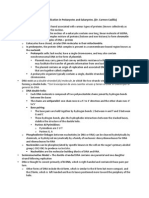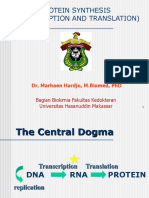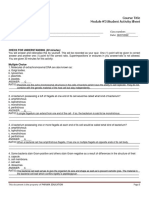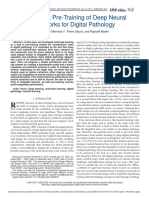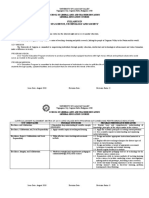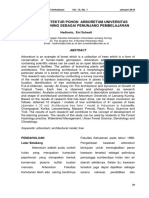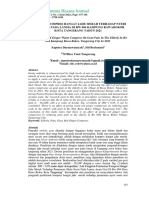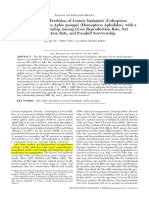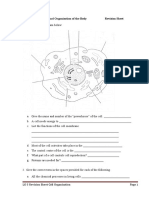0 ratings0% found this document useful (0 votes)
68 viewsDna Repair: By:Saurabh Kumar Sharma M.SC Biotechnology 2 Semester
Dna Repair: By:Saurabh Kumar Sharma M.SC Biotechnology 2 Semester
Uploaded by
Saurabh SharmaThis document summarizes different types of DNA repair mechanisms: direct repair, excision repair (including base excision repair and nucleotide excision repair), mismatch repair, recombinational repair, and repair of double-strand DNA breaks. It also discusses the importance of DNA repair for maintaining genetic stability, and the SOS response which enables cells to synthesize DNA repair enzymes in response to severe DNA damage. The key DNA repair pathways and their functions are outlined.
Copyright:
© All Rights Reserved
Available Formats
Download as PPTX, PDF, TXT or read online from Scribd
Dna Repair: By:Saurabh Kumar Sharma M.SC Biotechnology 2 Semester
Dna Repair: By:Saurabh Kumar Sharma M.SC Biotechnology 2 Semester
Uploaded by
Saurabh Sharma0 ratings0% found this document useful (0 votes)
68 views17 pagesThis document summarizes different types of DNA repair mechanisms: direct repair, excision repair (including base excision repair and nucleotide excision repair), mismatch repair, recombinational repair, and repair of double-strand DNA breaks. It also discusses the importance of DNA repair for maintaining genetic stability, and the SOS response which enables cells to synthesize DNA repair enzymes in response to severe DNA damage. The key DNA repair pathways and their functions are outlined.
Original Description:
dna repair mechanism
Original Title
DNA REPAIR
Copyright
© © All Rights Reserved
Available Formats
PPTX, PDF, TXT or read online from Scribd
Share this document
Did you find this document useful?
Is this content inappropriate?
This document summarizes different types of DNA repair mechanisms: direct repair, excision repair (including base excision repair and nucleotide excision repair), mismatch repair, recombinational repair, and repair of double-strand DNA breaks. It also discusses the importance of DNA repair for maintaining genetic stability, and the SOS response which enables cells to synthesize DNA repair enzymes in response to severe DNA damage. The key DNA repair pathways and their functions are outlined.
Copyright:
© All Rights Reserved
Available Formats
Download as PPTX, PDF, TXT or read online from Scribd
Download as pptx, pdf, or txt
0 ratings0% found this document useful (0 votes)
68 views17 pagesDna Repair: By:Saurabh Kumar Sharma M.SC Biotechnology 2 Semester
Dna Repair: By:Saurabh Kumar Sharma M.SC Biotechnology 2 Semester
Uploaded by
Saurabh SharmaThis document summarizes different types of DNA repair mechanisms: direct repair, excision repair (including base excision repair and nucleotide excision repair), mismatch repair, recombinational repair, and repair of double-strand DNA breaks. It also discusses the importance of DNA repair for maintaining genetic stability, and the SOS response which enables cells to synthesize DNA repair enzymes in response to severe DNA damage. The key DNA repair pathways and their functions are outlined.
Copyright:
© All Rights Reserved
Available Formats
Download as PPTX, PDF, TXT or read online from Scribd
Download as pptx, pdf, or txt
You are on page 1of 17
DNA REPAIR
BY :SAURABH KUMAR SHARMA
M.SC BIOTECHNOLOGY 2ND SEMESTER
CONTENTS
DNA REPAIR
TYPES OF REPAIR
DIRECT REPAIR
EXCISION REPAIR
MISMATCH REPAIR
RECOMBINATIONAL REPAIR
REAPAIR OF DOUBLE STRAND DNA BREAK
SOS RESPONSE
DNA REPAIR
Although the genetic variation is important for
evolution ,the survival of the individuals demands
genetic stability also .Maintaining genetic stability
requires not only an extreme accurate mechanism for
replication DNA ,but also mechanism for repairing
the many accidental lesions that occur continually in
DNA
Spontaneous changes in DNA are temporary because
they are immediately corrected by a set of process
known as DNA REPAIR
IMPORTANCE OF DNA REPAIR
Without repair system ,a genome would not be able
to maintain its essential cellular functions.
Most cells possess four different categories of DNA
repair system
Direct repair
Excision repair
Mismatch repair
Recombination repair
DIRECT REPAIR
Direct repair systems act directly on damaged
nucleotides,converting each one back to its original
structure .but only a few types damaged nucleotide
can be repaired directly
EXCISION REPAIR
Excision repair involves the excision of a segment of
the polynucleotide containing a damaged
site,followed by resynthesis of the correct
nucleotide sequence by dna polymersae.There are
two types of excision repair
1.Base excision repair
2.Nucleotide repair
BASE EXCISION REPAIR
NUCLEOTIDE EXCISION REPAIR
MISMATCH REPAIR
The mismatch repair system can detech mismatches
that occur in Dna replication .Enzymes systems
involved in mismatch repair are as follows:
Recognise mismatched base repair
Determine which base in the mismatch is the
incorrect one
Excise the incorrect base and carry out repair
synthesis
MISMATCH REPAIR
RECOMBINATIONAL REPAIR
Recombinational repair is a process of filling a gap
in one strand of dsDNA by retrieving a
homologous single strand from another dsDNA.It
is a post replication process because it occur after
replication
REPAIR OF DOUBLE STRAND DNA BREAK
Ionizing radiation ,oxidizing agents and replication
errors may cause double strand break in DNA.If
these lesions were left unrepaired,they would lead
to trhe breakdown of chromosomes into smaller
fragments
The double strand break (DSB) can be repaired by
the cellular non homologous end joining (NHEJ)
pathway and homology directed repair (HDR)
pathway.
REPAIR OF DOUBLE STRAND DNA BREAK
SOS REPAIR
Many cells have mechanisms that enable them to
synthesize DNA repair enzymes as an emergency
response to severe DNA damage .The best studied
examples is the SOS response in E.coli .The SOS
response is a coordinated cellular response in e.coli
and aids in the survival of the organism by
affecting the expression of proteins.
SOS REPAIR
CONCLUSION
Thank you to head of our deparment DR.SUDEEP
SIR AND TO THE CLASS TEACHER OF
MR.YUNUS SIR
You might also like
- How Human EvolvedDocument541 pagesHow Human Evolvedyunus100% (32)
- Plant Tycoon Seed CatalogDocument4 pagesPlant Tycoon Seed Catalogansherina250% (2)
- Arthur Macgregor, 1985, Bone Antler, İvory, HornDocument64 pagesArthur Macgregor, 1985, Bone Antler, İvory, Hornmustafa sarışahinNo ratings yet
- Gene Transfer TechniquesDocument36 pagesGene Transfer TechniquesDrMumtaz F MusaliarNo ratings yet
- Amoeba Sisters Intro To CellsDocument2 pagesAmoeba Sisters Intro To Cellsapi-34233421650% (2)
- IB Biology SL GeneticsDocument8 pagesIB Biology SL GeneticsAliciaChing24No ratings yet
- DNA Repair: Chapter FourDocument7 pagesDNA Repair: Chapter FourMatin Ahmad KhanNo ratings yet
- Dna Damage and RepairDocument23 pagesDna Damage and RepairLathifa FauziaNo ratings yet
- ZoologyDocument13 pagesZoologydvdmegaNo ratings yet
- Composed of A BaseDocument23 pagesComposed of A Basetanvi bhallaNo ratings yet
- RNA Transcription and TranslationDocument11 pagesRNA Transcription and TranslationMaiSakurajimaNo ratings yet
- Molecular Biology BIOL312Document273 pagesMolecular Biology BIOL312Paul GarciaNo ratings yet
- Nucleus: Click To Edit Master Subtitle StyleDocument29 pagesNucleus: Click To Edit Master Subtitle StyleAzifah ZakariaNo ratings yet
- Molecular Biology Unit IV and VDocument60 pagesMolecular Biology Unit IV and VchitraNo ratings yet
- Assignment of Molecular BiologyDocument4 pagesAssignment of Molecular BiologyNasir Hussain FarazNo ratings yet
- Genome OrganizationDocument20 pagesGenome Organizationkavishmehala28No ratings yet
- Replication - Transcription - TranslationDocument75 pagesReplication - Transcription - TranslationJason FryNo ratings yet
- Membrane TransportDocument24 pagesMembrane Transportolawandeilo123No ratings yet
- Chapt 7 DNA Replication NotesDocument8 pagesChapt 7 DNA Replication Notesmalenya1100% (1)
- Eukaryotic Dna Replication PDFDocument2 pagesEukaryotic Dna Replication PDFHughNo ratings yet
- DNA Replication: DNA Replication Is A Biological Process That Occurs in AllDocument12 pagesDNA Replication: DNA Replication Is A Biological Process That Occurs in AllAnonymous HChxHbANo ratings yet
- Comet AssayDocument15 pagesComet AssayarunsaintNo ratings yet
- 1 Molecular GeneticsDocument10 pages1 Molecular GeneticsAbdullah Sawalha100% (1)
- Sperm Morphology - 2019 FinalDocument44 pagesSperm Morphology - 2019 FinalDr Jitu moni DasNo ratings yet
- Control of Gene Expression: Drh. Wawid Purwatiningsih, M.VetDocument20 pagesControl of Gene Expression: Drh. Wawid Purwatiningsih, M.Vet'Triiey UthaMy'No ratings yet
- DNA Technology and Genomics: General Outline of Genetic EngineeringDocument15 pagesDNA Technology and Genomics: General Outline of Genetic EngineeringSaadia AnjumNo ratings yet
- The Biology of Cancer: Gracieux Y. Fernando, MD, FPCP, Fpsmo, MhpedDocument128 pagesThe Biology of Cancer: Gracieux Y. Fernando, MD, FPCP, Fpsmo, MhpedManila Med0% (1)
- GROUP1-DNA Replication in ProkaryotesDocument24 pagesGROUP1-DNA Replication in ProkaryotesAlbert Jade Pontimayor Legaria100% (1)
- DNA Replication Prokaryotes EukaryotesDocument38 pagesDNA Replication Prokaryotes EukaryotesSudeep BiswasNo ratings yet
- NucleusDocument10 pagesNucleusPinak ChowdhuryNo ratings yet
- Replication in EukaryotesDocument8 pagesReplication in EukaryotesnaliniNo ratings yet
- Dna ExtractionDocument7 pagesDna ExtractionYamunaa ElencovanNo ratings yet
- Genetic Code, Translation, Gene Expression Regulation, HGPDocument26 pagesGenetic Code, Translation, Gene Expression Regulation, HGPNidhi gupta100% (1)
- In-Depth Steps Towards Nucleic Acid and Protein SynthesisDocument21 pagesIn-Depth Steps Towards Nucleic Acid and Protein SynthesisGbenga AjaniNo ratings yet
- Molecular BiologyDocument9 pagesMolecular Biologyrifat RasheedNo ratings yet
- Gene Expression and RegulationDocument44 pagesGene Expression and RegulationSyama J.S100% (1)
- Regulation of The Cell Cycle For UVLeDocument31 pagesRegulation of The Cell Cycle For UVLeErika Corinne SisonNo ratings yet
- Staining Techniques in Biological StudiesDocument52 pagesStaining Techniques in Biological StudiesRamyaAbhishekShenoyNo ratings yet
- Cell Cycle Regulators: Namrata Sengupta Mds 1 Year Oral Pathology & MicrobiologyDocument33 pagesCell Cycle Regulators: Namrata Sengupta Mds 1 Year Oral Pathology & MicrobiologyMadhura ShekatkarNo ratings yet
- DNA Replication and Protein SynthesisDocument5 pagesDNA Replication and Protein SynthesisFrezelVillaBasiloniaNo ratings yet
- Lecture On Transcription and TranslationDocument47 pagesLecture On Transcription and TranslationAnna Beatrice BautistaNo ratings yet
- Module-1: Genomics and Proteomics NotesDocument8 pagesModule-1: Genomics and Proteomics NotesNishtha KhannaNo ratings yet
- Post Transcriptional ModificationDocument4 pagesPost Transcriptional Modificationrustyryan770% (1)
- Post Transcriptional ModificationDocument3 pagesPost Transcriptional ModificationLubainur RahmanNo ratings yet
- The NucleusDocument91 pagesThe NucleuskubuldinhoNo ratings yet
- Cilia and FlagellaDocument25 pagesCilia and FlagellaLia Savitri RomdaniNo ratings yet
- ReplicationDocument45 pagesReplicationAleena MustafaNo ratings yet
- Asn of Genetics by Umair 26Document7 pagesAsn of Genetics by Umair 26sdfksssglksfdfgsNo ratings yet
- Intracellular TransportDocument66 pagesIntracellular Transportalvitakhoridatul100% (1)
- Stem Cells in HumansDocument4 pagesStem Cells in HumansSana NainaNo ratings yet
- The Cell Cycle and How Cells DivideDocument63 pagesThe Cell Cycle and How Cells DivideSrikanth KagithojuNo ratings yet
- Chick NeurulationDocument14 pagesChick NeurulationSophia RubiaNo ratings yet
- Cell Cycle: - Dr. Ishita SinghalDocument69 pagesCell Cycle: - Dr. Ishita SinghalDR. ISHITA SINGHAL100% (1)
- DNA LibrariesDocument17 pagesDNA LibrariesIram AnwarNo ratings yet
- Unit 5 - Dna ReplicationDocument55 pagesUnit 5 - Dna Replicationapi-262235970100% (1)
- Cell-Cell Adhesion and Cell Junction: Submitted by Ashish Palodkar Msc. Biotechnology 1 SemDocument70 pagesCell-Cell Adhesion and Cell Junction: Submitted by Ashish Palodkar Msc. Biotechnology 1 SemGovinda BiswasNo ratings yet
- Dna Finer PrintingDocument11 pagesDna Finer PrintingmycatalystsNo ratings yet
- DNA Replication in Prokaryotes and EukaryotesDocument7 pagesDNA Replication in Prokaryotes and Eukaryotessmn416No ratings yet
- Gene Expression in ProkaryotesDocument43 pagesGene Expression in ProkaryotesravibiriNo ratings yet
- Protein Synthesis (Transcription and Translation) : Dr. Marhaen Hardjo, M.Biomed, PHDDocument159 pagesProtein Synthesis (Transcription and Translation) : Dr. Marhaen Hardjo, M.Biomed, PHDsNo ratings yet
- PonsDocument18 pagesPonsDr.Saber - Ar - Raffi100% (1)
- Prokaryotic and Eukaryotic DNA ReplicationDocument11 pagesProkaryotic and Eukaryotic DNA ReplicationSarmistha NayakNo ratings yet
- Genetic TechnologyDocument36 pagesGenetic TechnologyAnggraeni Kusuma Wardani100% (1)
- Replication Unit 4 Biology NotesDocument35 pagesReplication Unit 4 Biology NotesAakash ReddyNo ratings yet
- Microbio LEC SAS 3Document3 pagesMicrobio LEC SAS 3spooderm4nNo ratings yet
- The Presence of Self 9780847693856Document317 pagesThe Presence of Self 9780847693856Vivek EkboteNo ratings yet
- ICSE10 - Biology - Full Portion Test Paper - 01Document8 pagesICSE10 - Biology - Full Portion Test Paper - 01Debarghya DuttaNo ratings yet
- People and The Earth Ecosystem Module 2Document10 pagesPeople and The Earth Ecosystem Module 2Franz Thelen Lozano CariñoNo ratings yet
- Influence of Nitrogen and Spacing On Growth and Yield of Chia (Salvia Hispanica) in Meru County, KenyaDocument10 pagesInfluence of Nitrogen and Spacing On Growth and Yield of Chia (Salvia Hispanica) in Meru County, KenyaPremier PublishersNo ratings yet
- Cellular Structure and FunctionDocument4 pagesCellular Structure and Functionsalmasadiq2008No ratings yet
- Agustus-juli-Ke 21 PiraDocument129 pagesAgustus-juli-Ke 21 PiraErlanda ThegarNo ratings yet
- Multi-Task Pre-Training of Deep Neural Networks For Digital PathologyDocument10 pagesMulti-Task Pre-Training of Deep Neural Networks For Digital Pathology刘天岑No ratings yet
- Monitoring The Ecology of Bacillus During Daqu In-Wageningen University and Research 291543Document10 pagesMonitoring The Ecology of Bacillus During Daqu In-Wageningen University and Research 291543Muhammad RifqiNo ratings yet
- NGEC - Science Technology and SocietyDocument21 pagesNGEC - Science Technology and SocietyMa. Oliva Diana CastroNo ratings yet
- Model Arsitektur Pohon Arboretum Universitas Lancang Kuning Sebagai Penunjang PembelajaranDocument16 pagesModel Arsitektur Pohon Arboretum Universitas Lancang Kuning Sebagai Penunjang PembelajaranamarNo ratings yet
- Saputra Darmawansyah 157 166Document10 pagesSaputra Darmawansyah 157 166mukhlish hidayatNo ratings yet
- Biomath FinalDocument25 pagesBiomath FinalJomar RabajanteNo ratings yet
- Ann. Entomol. Soc. Am. 98 (4) : 475Ð482 (2005) : Lemnia BiplagiataDocument8 pagesAnn. Entomol. Soc. Am. 98 (4) : 475Ð482 (2005) : Lemnia BiplagiataMehmet Salih ÖzgökçeNo ratings yet
- Poster Making and Gallery WalkDocument3 pagesPoster Making and Gallery WalkOdyssey Nicolle Esquejo LuisNo ratings yet
- The Fundamental Unit of Life Intext Questions: WWW - Ncrtsolutions.inDocument8 pagesThe Fundamental Unit of Life Intext Questions: WWW - Ncrtsolutions.inPriyanka PanwarNo ratings yet
- AP Biology - Chapter 1 Discussion AnswersDocument3 pagesAP Biology - Chapter 1 Discussion Answersangel91me6371100% (8)
- Communities and Ecosystems (Robert H. Whittaker) (Z-Library)Document420 pagesCommunities and Ecosystems (Robert H. Whittaker) (Z-Library)amruthamNo ratings yet
- Reviewer For First Quarter GENBIO1Document57 pagesReviewer For First Quarter GENBIO1Rshyron Crain GrospeNo ratings yet
- Drop MethodDocument2 pagesDrop MethodCharlene Bularan100% (2)
- LO 3 Cell Structure Revision SheetDocument11 pagesLO 3 Cell Structure Revision SheetMoza AlaliliNo ratings yet
- 201 E Exam TimetableDocument5 pages201 E Exam TimetableIsrael AdemolaNo ratings yet
- US HUPO Abstract BookDocument165 pagesUS HUPO Abstract BookBrianna FlinkNo ratings yet
- (Buzsáki) - Scaling Brain Size - Keeping Timing - Brain Rhythms (Semana 5)Document14 pages(Buzsáki) - Scaling Brain Size - Keeping Timing - Brain Rhythms (Semana 5)valentina castilloNo ratings yet
- GPB 121 Most Probable Que PaperDocument2 pagesGPB 121 Most Probable Que Paperpratikwagh112002No ratings yet





